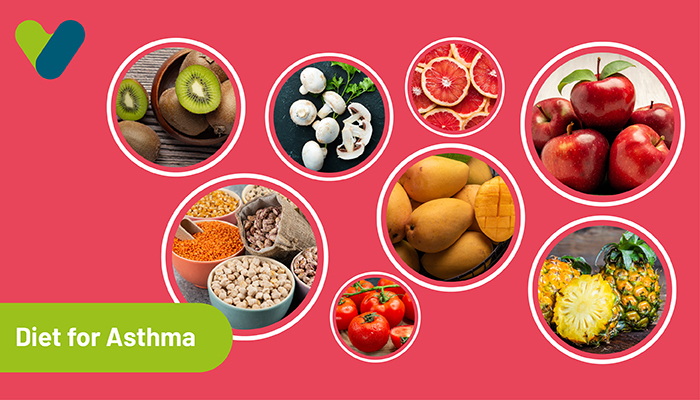Asthma is a chronic pulmonary disorder that causes inflammation in the lung airways and makes them narrow. As someone diagnosed with asthma, you may experience symptoms such as shortness of breath, wheezing, lingering cough, chest tightness, among other conditions. Mild symptoms don't interfere with your daily life. However, severe symptoms can lead to an asthma attack. Since there's no known cure for asthma, doctors prescribe medication like bronchodilators, anti-inflammatory drugs, and sometimes, injections. Another important aspect of your asthma treatment plan is maintain a proper diet. While there's no specific asthma diet to follow to eliminate the symptoms caused by this illness, you can take measures to avoid consuming asthma-aggravating foods.
Role Of Nutrition In Asthma
As western dietary patterns become pervasive, the incidence of asthma keeps increasing. A plant-based diet may improve symptoms due to their effect on systemic inflammation. Moreover, some foods can help manage cytokine release and immune responses that cause the narrowing of the airways. Obese children are at a higher risk of developing asthma and subsequent asthma flares. Weight management diet can also help keep asthma symptoms in control.
Foods to Eat During Asthma
Several food groups may help you keep your asthma symptoms in check. They are as follows:- Fruits and Vegetables A plant-based diet plays a vital role in reducing the risk of asthma symptoms. Fruits like apples and oranges contain an array of potent antioxidants that help control free oxygen radicals. These radicals are mediators of inflammatory diseases, including asthma. Lycopene is another effective antioxidant found in tomatoes. It can reduce the antibody influx in the airways that cause inflammation. The anti-inflammatory properties of flavonoids in raw vegetables may also improve asthma symptoms over time. High consumption of fruits and vegetables in children has been associated with reduced wheezing.
- Vitamin C Vitamin C, which is also found in fruits and vegetables, hydrates the airway surfaces and reduces free radicals. Vitamin C also impedes prostaglandin synthesis that induce inflammation and bronchoconstriction. It stops the regeneration of oxidised vitamin E and allows it to shorten the oxidation of free radicals which otherwise cause inflammation. Pineapples, kiwifruits, mangoes, cantaloupes, grapefruits, etc., are rich sources of vitamin C and asthma patients can benefit from including these in their diet.
- Vitamin D Prevalence of asthma is also linked with vitamin D insufficiency or deficiency. Active vitamin D plays an important role in innate and adaptive immunity. It helps the body fend off respiratory infections and inflammatory diseases. Vitamin D also assists with the disintegration of bacterial cell walls and strengthens the immune system. It controls the adaptive immunity by producing an anti-inflammatory response. While sunlight is a natural vitamin D source, foods like oranges, kale, mushrooms, fortified milk and yoghurt, etc., should be part of an asthma patient's diet.
- Magnesium Magnesium is an important component of bronchodilators – a medication for asthma. As such, a magnesium-rich diet can prevent asthma flares. Foods like legumes, seeds, leafy green vegetables, yogurt, fortified foods, etc., are rich in magnesium. This compound helps reduce airway inflammation and blocks chemicals that cause muscle spasms. Additionally, magnesium increases the nitric oxide levels which can help lower the inflammation.
- Whole Grains Whole grains are valuable nutrient sources and should be an essential part of your asthma diet. They contain phytochemicals, vitamins and minerals that help in disease prevention. Whole grains are also rich in soluble and insoluble fibres that impact your gut. Gut health can influence asthma symptoms. The microbes present in the gut ferment whole grain fibres, which can help regulate the immune system. Grains also regulate inflammatory cytokine production and pro-inflammatory responses in the lung airways. Whole grain foods like barley, millet, bulgur, brown rice, amaranth, buckwheat, pearl sago, etc., can improve gut health, which consequently reduces asthma symptoms.
Asthma Diet – What You Shouldn’t Eat
An asthma patient's diet should not include the following food products:- High Fat Diets Dietary fats typically affect airway inflammation. Unsaturated fats from nuts, olive oils, fatty fish, dark chocolate, etc., help control asthma. Conversely, saturated fats from red meat, full-fat dairy products, baked goods, etc., may aid inflammation. Saturated fats activate receptors that lead to immune response and inflammation. Fat can also negatively alter gut bacteria and cause asthma flares.
- High Gas-Causing Foods The digestive system breaks down food through fermentation. As food ferments, it releases gas. While consuming such foods is necessary for a balanced diet, excess gas puts pressure on the diaphragm. This can lead to chest retractions and consequent asthma flares. Foods that cause gas include cabbage, fried foods, carbonated drinks, beans, etc.
- Preserved Foods & Beverages Preserved or canned foods and beverages like pickles, dried fruits, alcohol, bottle juice, etc., are foods to avoid with asthma. They contain sulphites – a type of preservative that can irritate the airways. Alcoholic drinks can also cause hypersensitivity reactions in the airways and worsen the asthma symptoms.
- Food Allergens People who have a multitude of allergies may often have inflamed airways. Common allergy-triggering foods include peanuts, dairy (lactose intolerance), shellfish, soybeans, some whole grains, etc., and are among the foods to avoid with asthma.
